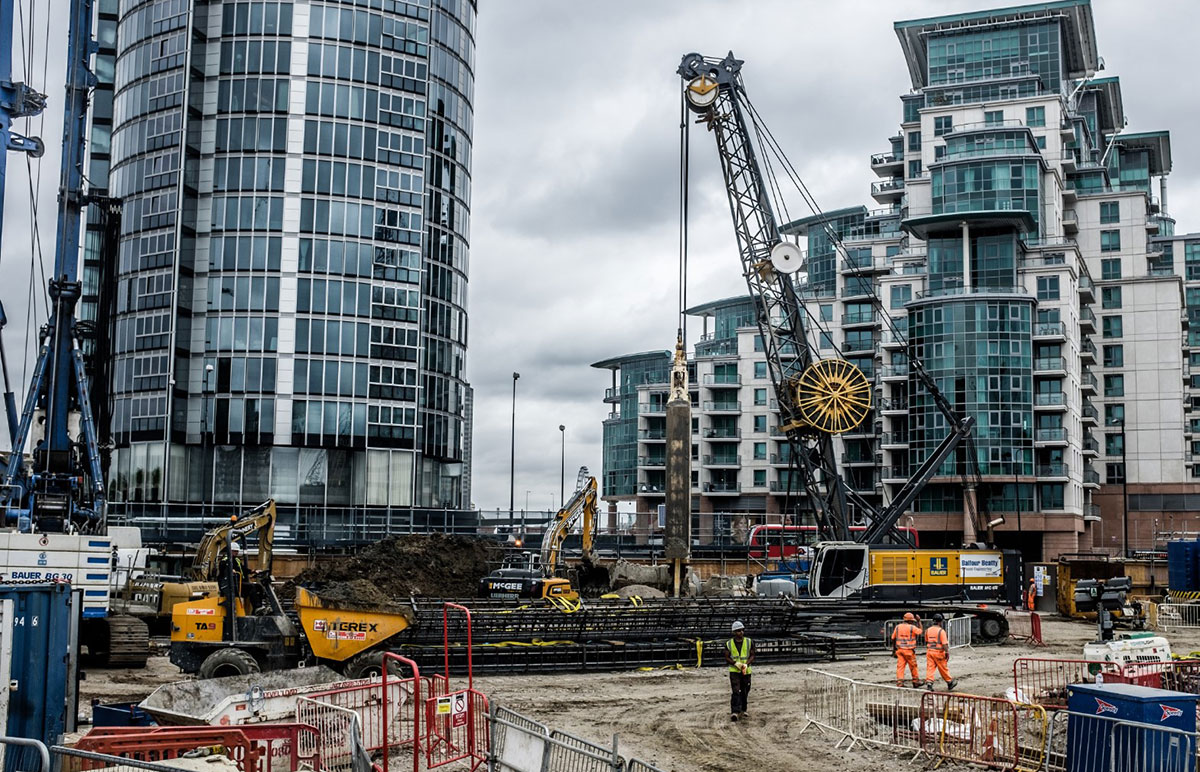A Biased View of Geotheta
A Biased View of Geotheta
Blog Article
Geotheta Things To Know Before You Get This
Table of ContentsSome Known Incorrect Statements About Geotheta Geotheta for DummiesSome Ideas on Geotheta You Should KnowHow Geotheta can Save You Time, Stress, and Money.8 Easy Facts About Geotheta Explained

They carry out website examinations, collect examples, execute laboratory examinations, and assess information to examine the viability of the ground for building and construction tasks - Geo Tech Engineering. Based upon their searchings for, geotechnical engineers offer recommendations for structure style, slope security, keeping frameworks, and reduction of geotechnical threats. They collaborate with other experts, such as designers, architectural designers, and building groups, to ensure that geotechnical factors to consider are incorporated into the general job style and implementation
By assessing the habits and buildings of soil and rock, they can recognize prospective geotechnical threats such as landslides, dirt negotiation, or incline instability. Their experience helps stop failures or accidents that can endanger lives and home. Below are some detailed obligations and duties of a geotechnical designer: Site Investigation: Geotechnical engineers conduct website examinations to gather data on subsurface problems.
They translate the information to comprehend the residential properties and habits of the soil and rock, including their stamina, permeability, compaction features, and groundwater conditions. Geotechnical Evaluation and Layout: Geotechnical designers analyze the data accumulated throughout site investigations to examine the security and suitability of the website for building tasks. They do geotechnical computations and modeling to evaluate aspects such as bearing ability, negotiation, incline security, lateral planet pressures, and groundwater circulation.
The Best Strategy To Use For Geotheta
Foundation Layout: Geotechnical engineers play a vital function in making foundations that can safely support the intended framework. They evaluate the dirt problems and load requirements to identify the proper foundation kind, such as superficial structures (e.g., footings), deep structures (e.g (https://geotheta-46958753.hubspotpagebuilder.com/blog/unlocking-the-future-with-top-notch-geotechnical-engineers-at-geotheta)., heaps), or specialized methods like soil improvement. They take into consideration aspects such as settlement restrictions, bearing ability, and soil-structure interaction to create optimal structure layouts
They assess building plans, screen website activities, and conduct area inspections to validate that the design recommendations are followed. If unforeseen geotechnical concerns develop, they evaluate the situation and offer referrals for remediation or changes to the design. Risk Analysis and Reduction: Geotechnical engineers evaluate geotechnical risks and risks connected with the task site, such as landslides, liquefaction, or dirt disintegration.

Collaboration and Interaction: Geotechnical designers work very closely with various other professionals associated with a job, such as architects, architectural designers, and building teams. Effective interaction and cooperation are vital to integrate geotechnical considerations into the overall task design and construction process. Geotechnical engineers provide technical knowledge, solution queries, and guarantee that geotechnical needs are satisfied.
Getting The Geotheta To Work
Right here are some kinds of geotechnical designers: Structure Engineer: Foundation engineers concentrate on making and examining structures for frameworks. They analyze the dirt conditions, tons requirements, and site characteristics to identify the most proper structure kind and style, such as shallow structures, deep foundations, or specialized strategies like pile foundations.
They review the factors influencing slope stability, such as dirt buildings, groundwater conditions, and incline geometry, and develop approaches to stop slope failures and alleviate dangers. Earthquake Designer: Earthquake engineers concentrate on assessing and making frameworks to hold up against seismic pressures. They analyze the seismic risk of a website, review dirt liquefaction potential, and establish seismic style criteria to make certain the safety and durability of frameworks throughout earthquakes.
They execute field screening, gather samples, and analyze the collected information to define the soil properties, geologic formations, and groundwater problems at a website. Geotechnical Instrumentation Engineer: Geotechnical instrumentation designers focus on surveillance and determining the behavior of soil, rock, and structures. They set up and maintain instrumentation systems that keep track of elements such as dirt negotiation, groundwater degrees, incline movements, and architectural variations to analyze performance and give early cautions of prospective problems.
What Does Geotheta Mean?
They conduct examinations such as triaxial examinations, combination examinations, straight shear tests, and leaks in the structure examinations to gather data for geotechnical analysis and design. Geosynthetics Engineer: Geosynthetics engineers specialize in the design and application of geosynthetic materials, such as geotextiles, geogrids, and geomembranes. They use these products to improve soil security, strengthen slopes, provide drainage remedies, and control erosion.
They tend to be investigatory people, which implies they're intellectual, introspective, and analytical. They are curious, methodical, reasonable, logical, and logical. A few of them are likewise social, suggesting they're kind, charitable, cooperative, individual, caring, handy, compassionate, tactful, and friendly. Does this sound like you? Take our complimentary career examination to figure out if geotechnical engineer is one of your top occupation matches.
In the office setting, geotechnical engineers use specialized software program tools to perform estimations, develop layouts, and assess data. They prepare reports, testimonial project requirements, communicate with customers image source and group members, and coordinate project activities. The workplace setting provides a favorable setting for study, evaluation, and cooperation with various other professionals involved in the task.
The Main Principles Of Geotheta
They regularly go to task sites to perform site investigations, analyze geotechnical problems, and collect information for analysis. These check outs include taking a trip to various places, in some cases in remote or difficult surfaces. Geotechnical designers might perform soil tasting, conduct examinations, and display construction tasks to guarantee that the geotechnical elements of the project are being executed appropriately.
Geotechnical engineers likewise work in specialized geotechnical labs. Geotechnical research laboratory designers function extensively in these atmospheres, dealing with testing devices, running tools, and tape-recording data.
Report this page